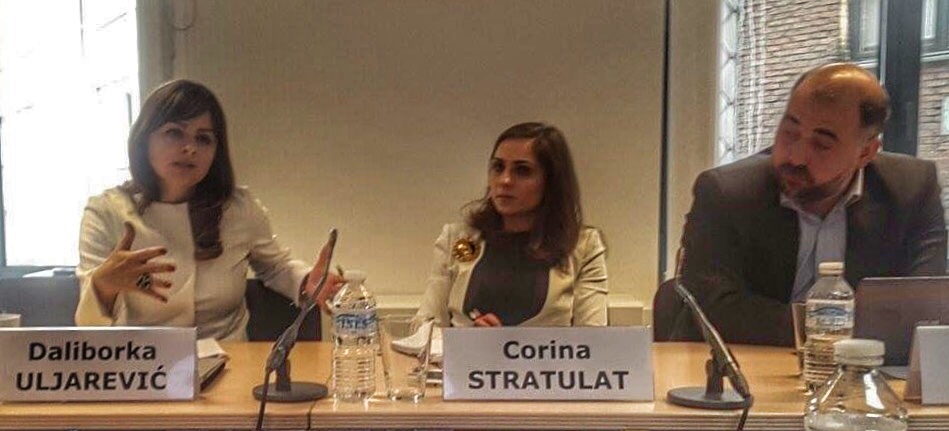Daliborka Uljarević, Centre for Civic Education (CCE) executive director, today spoke at the event organised by European Policy Centre (EPC) from Brussels, in cooperation with European Fund for the Balkans, on the subject “EU Enlargement and the Berlin process: What role for civil society?”.
This policy dialogue was organised in the European Policy Centre in Brussels, and apart from the CCE executive director, speakers were also Andris Kesteris, Principal Advisor from Civil Society and Media in DG NEAR, Niccolo Milanese, Chairperson of European Alternatives, Dane Taleski, Visiting Fellow from Centre for Southeast European Studies at Graz University, Igor Bandović, Senior Programme Manager of European Fund for the Balkans, and Corina Stratulat, Senior Policy Analyst from European Policy Centre, who also moderated the debate.
At the Western Balkans Summit in Vienna last year, the representatives of civil society organisations (CSOs) from the Balkans were, for the first time, given the opportunity to get involved in the Berlin process by presenting policy recommendations. Follow-up initiatives, as this meeting, aim to strengthen the capacity of civil society actors in anticipation of the upcoming Western Balkans Paris Summit this July, where CSOs will be able to make their voice heard in the framework of the Civil Society Forum. Hence, the focus of this discussion was on the evaluation of readiness of civil society in terms of the use of possibilities granted by the Berlin process, but also on challenges which civil society in region faces.
In that regard, Daliborka Uljarević presented the Montenegrin experience in terms of the activities of NGO sector in the process of democratisation and Europeanisation of Montenegrin society, with the emphasis on the involvement of NGO sector in the process of negotiations through working groups for the preparation of negotiations. She pointed out: “The process of negotiations between the EU and Montenegro made room for series of opportunities for civil society, but also for the cooperation of different social actors, even though this is still insufficiently practiced. The contribution of NGOs in the implementation of reforms is immense and multi-layered, but it seems to be much more appreciated in Brussels than in Montenegro, and has to be changed. There is no need for our initiatives to travel to Brussels and back in order to be taken seriously by the authorities, because we are losing precious time and energy in that manner”. She also described the environment in which the NGO sector operates in Montenegro by reflecting on smear campaigns, which were conducted during last couple of years against prominent NGO activists, thereby hoping that “the ones who created those campaigns figured out that such actions can not restrict the autonomous and critically-oriented NGO sector”. Uljarević concluded that new Government of Election Trust could contribute in the establishment of political culture which fosters the dialogue of diverse sides, if it terminates some of the poor practices which polarised Montenegrin society.
The event gathered around 40 representatives of Council of European Union, European Parliament, European Commission, diplomatic missions to EU, Belgian Ministry of Foreign Affairs, as well as of influential civil society organisations with headquarters in Brussels.
Svetlana Pešić, programme associate

